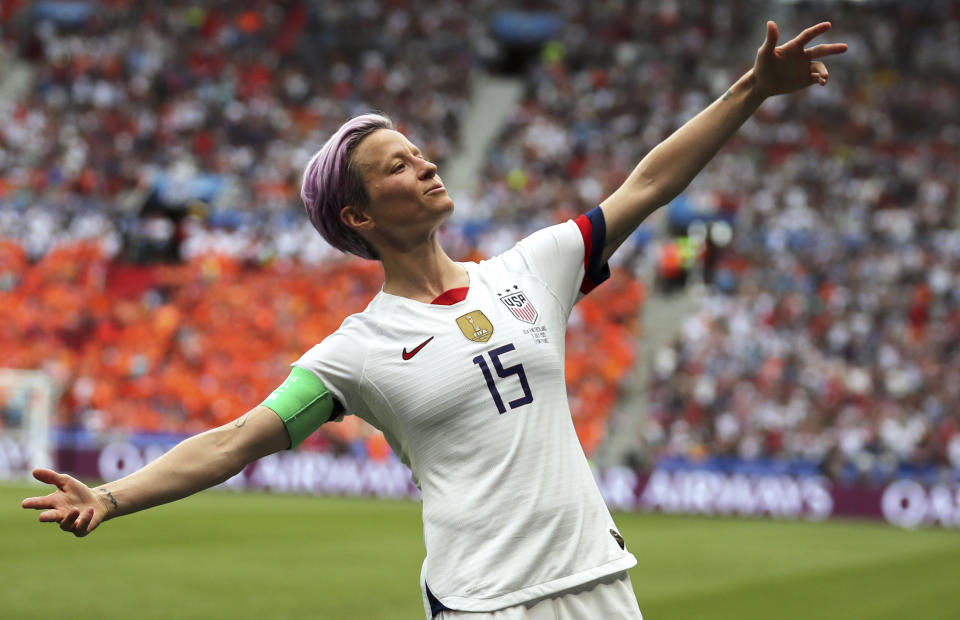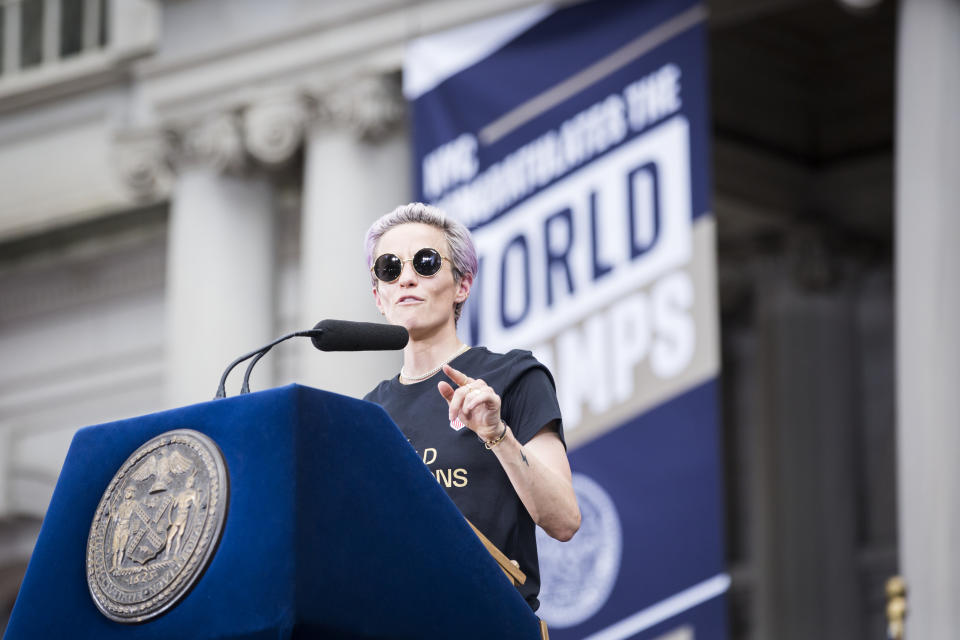Why Megan Rapinoe is head and shoulders above the rest as soccer's player of the year
The day before the United States women’s national team set off for France and its glorious march to a second straight Women’s World Cup title, Megan Rapinoe stood off to the side. After a major press event at the Twitter headquarters in Midtown Manhattan, the entire team had been brought back out for the presentation of a foosball table with the faces of the players sculpted to look just like the national teamers’. An impromptu match broke out on the table and quickly turned into a cauldron of shouting and shrieking. Every player on the team was enthralled. Except for one.
Rapinoe did her own thing.
Just before she’d go on a triumphant tour, winning both the Golden Ball and the Golden Boot, while getting into a very public spat with the president, she chatted with a few reporters, talking casually, catching up. It was Rapinoe off on her own, very much part of the team yet also separate from it, somehow.
Because Rapinoe is her own woman, charting her own course and going her own way. Which is what inarguably made 2019 in soccer the Year of Rapinoe.
This year, she not only won all that silverware at the World Cup – the big trophy; the player of the tournament; the top scorer; and the player of the final – but she also collected the Best FIFA Women’s Player prize and the Ballon d’Or Feminin. She won every major prize of the year.
But she used FIFA’s Best ceremony to talk about racism and the lack of serious action on the governing bodies’ part. In a video message, she utilized the Ballon d’Or stage to call on Lionel Messi and Cristiano Ronaldo, the twin superstars of the men’s game, to use their gargantuan platforms for good, and not just to make money.

Before that, when the national team was feted with its second ticker-tape parade in just over four years, Rapinoe strode to the podium and made an impassioned speech challenging the entire nation to do better.
She was also named Sports Illustrated’s Sportsperson of the Year. At the awards ceremony, Rapinoe now being irrepressibly Rapinoe, she gently chided the very magazine that had given her the prize for not awarding it to more women in the past. And she also called out the publication for not featuring more female writers or writers of color in its pages.
No female soccer star has ever been nearly so outspoken. Especially not a member of the U.S. women’s national team, a dominant institution that had cloaked itself in an id of inspiring young women without really ever speaking out on the issues that might affect them.
But Rapinoe had been on this trajectory for a while. She became the first member of the team to publicly come out of the closet back before the 2012 Olympics, paving the way for a good handful of teammates to follow in her footsteps. And then, in 2016, she began kneeling for the national anthem before NWSL and then national team games in support of Colin Kaepernick. U.S. Soccer summarily passed a bylaw obligating players to stand for the anthem and Rapinoe, cornered and very much putting her career at risk if she persevered, obeyed it.
That might have been the last we heard of her, as she played sporadically for a few months and wasn’t included on the roster for the annual SheBelieves Cup the following spring – she was also hobbled by a lingering injury but Rapinoe told Sports Illustrated that she doesn’t think that was why she was left out.
Yet she made herself undeniable on the field and gave herself a bigger bullhorn than ever before.
In spite of turning 34 two days before the World Cup final, Rapinoe also had her most productive year ever, national team goal-wise, with nine.

Off the field, she inadvertently stirred controversy by casually declaring that she wouldn’t be “going to the f---ing White House” on camera, should the U.S. win the World Cup. And then she got into a high-profile exchange with the president and the White House.
Undeterred by controversy, she told Yahoo Sports that she’d “probably never put my hand over my heart” and “probably never sing the national anthem again.”
Meanwhile, she was one of the leaders of the national team’s ongoing equal-pay fight and struck an instantly iconic pose, arms splayed, head cocked back just so, after several of her World Cup goals.
“It was kind of like a ‘F--- you,’ but with a big smile and a s--- eating grin,” Rapinoe explained to Sports Illustrated. “You are not going to steal any of our joy.”
Taken together, Rapinoe established herself as one of the most politically vocal women to ever play sports, joining Billy Jean King and Martina Navratilova. In 2019, she played and talked her way into the pantheon of sportsmen and women who not only transcended their respective games but rose to have an outsized influence beyond it, a club that includes, of course, Kaepernick, whose protest Rapinoe supported and thereby set out on her own social justice journey.
One end of the political spectrum recoils at her and her actions, as it once did to Muhammad Ali, Kareem Abdul Jabbar, Arthur Ashe, John Carlos and Tommie Smith.
All the same, Rapinoe will do things her way.
Leander Schaerlaeckens is a Yahoo Sports soccer columnist and a sports communication lecturer at Marist College. Follow him on Twitter @LeanderAlphabet.
More from Yahoo Sports:

 Yahoo Lifestyle
Yahoo Lifestyle 

